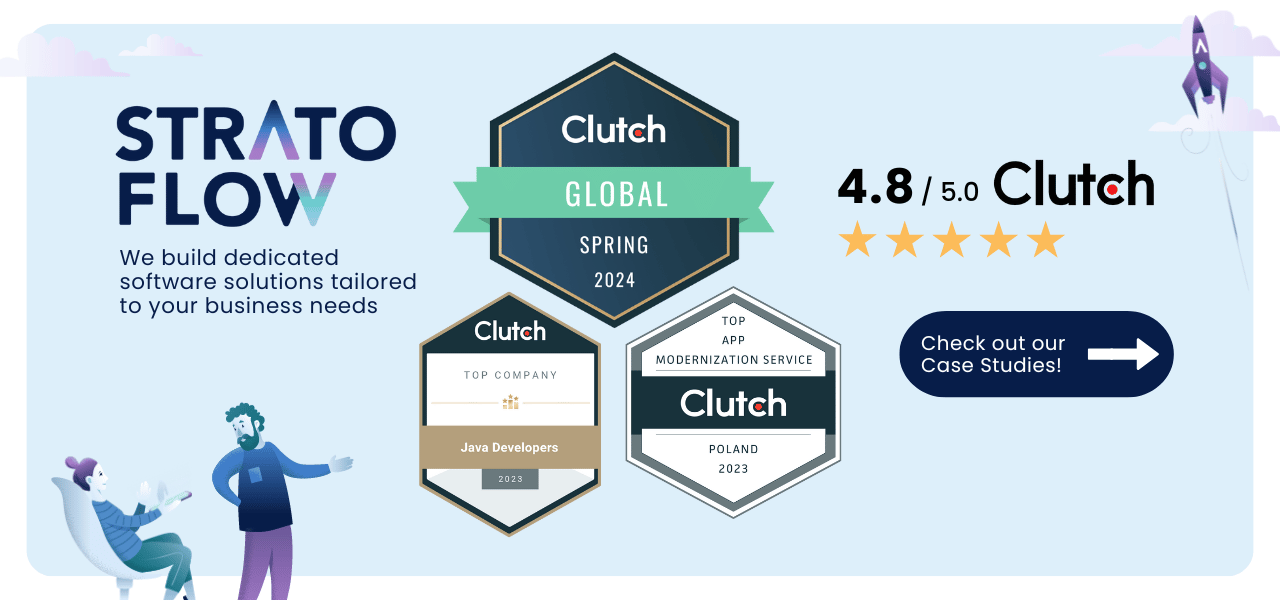
How To Hire Dedicated Developers in Europe [Benefits & Models]
Navigating the world of software development can be daunting, especially when it comes to hiring the right talent.
Our latest guide to hiring dedicated developers is here to simplify that journey for you.
This article offers a step-by-step approach that demystifies the process of finding and managing dedicated developers who can turn your vision into reality. Get ready to unlock the secrets to assembling the perfect team of experienced developers that will take your project to new heights!
Contents
- Who are dedicated developers?
- Hiring dedicated developers models
- Where to find dedicated developers?
- How much does a dedicated developers team cost?
- How to hire dedicated programmers in eight steps
- What to avoid when hiring dedicated developers – three common mistakes
- How to manage a dedicated team?
- What are the benefits of hiring dedicated developers?
- Hire dedicated developers with Stratoflow
Who are dedicated developers?
The software development process is a lot like building a house – there are a lot of materials, parts, and components that need to come together to create something great.
And every construction project needs skilled builders.
In the case of software projects, this role is filled by dedicated developers.
Dedicated software developers are specialized professionals a company hires to work exclusively on its software development projects.
Nowadays, nearly every company and organization seeks to hire dedicated developers. This approach enables them to complete their projects efficiently without the concerns of managing salaries, benefits, reimbursements, and other responsibilities tied to employing full-time, in-house developers.
Working with dedicated developers lets organizations focus on the key objectives of the business and generate value.
After all, software solutions are the backbone of any modern enterprise. If your software is lacking, it will certainly hurt your business performance – it is as simple as that.
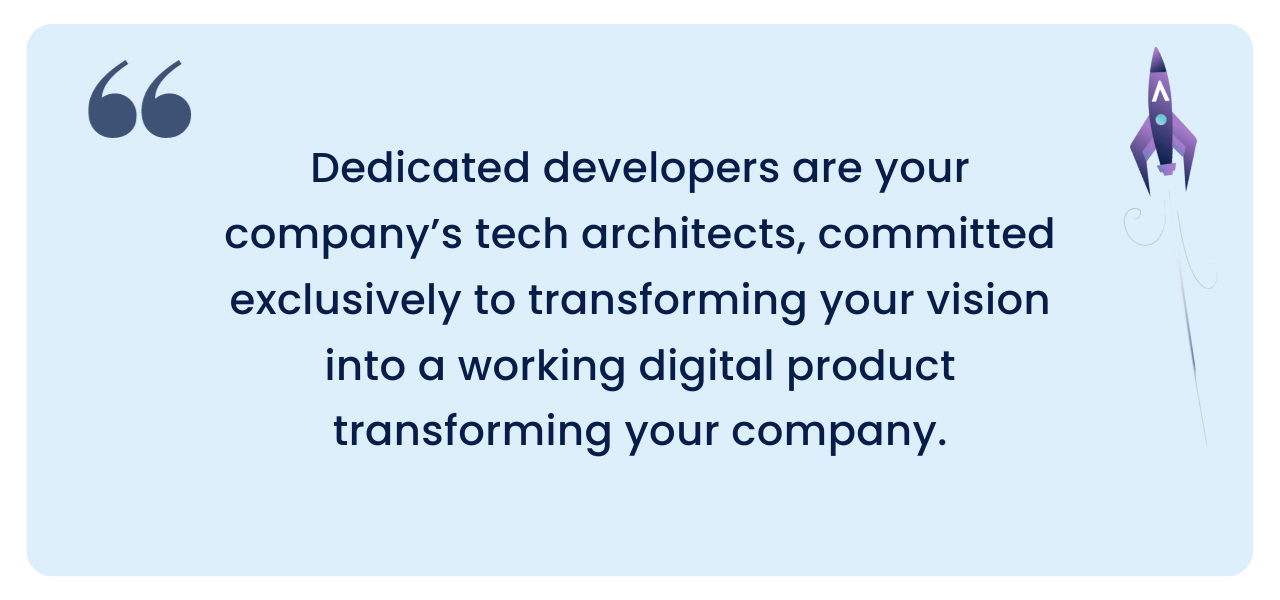
When should you hire dedicated developers?
Recruiting skilled developers in-house is a lengthy and resource-intensive process, requiring significant investment of time, effort, and operational costs.
That’s why Hiring dedicated developers can be a strategic move for your company in situations like:
When you need access to specialized talent
There are times when a project requires niche expertise or cutting-edge technology that your in-house team might not possess.
Whether it’s advanced AI algorithms, high-performance software development, cloud architecture, or industry-specific solutions like healthcare or finance tech, hiring dedicated developers allows you to tap into specialized talent without the need to invest in long-term training or recruitment.
When you need to expand capacity during high-demand
When business operations ramp up due to seasonal surges or product launches, your in-house team may struggle to manage the increased workload.
Hiring dedicated developers in such cases helps you scale efficiently, bringing in the manpower needed to meet deadlines without compromising on quality. This model gives you the flexibility to handle peak demand while allowing you to quickly scale down once the workload stabilizes.
It’s a perfect solution for maintaining agility and keeping project timelines intact.
When you want to maintain focus on the core business and optimize costs
In many cases, businesses need to focus on their core operations – like sales, customer service, or strategy – without diverting their internal team to time-consuming software development tasks.
Hiring dedicated developers enables you to outsource these specialized tasks, allowing your key personnel to concentrate on growth initiatives.
Moreover, the cost-efficiency of hiring dedicated developers often proves more economical than expanding your in-house team, especially when factoring in recruitment, onboarding, and training costs – something that is crucial, especially in the current economic climate.
Hiring dedicated developers models
There are a couple of ways to hire dedicated developers depending on the type of cooperation that you want to go for.
Let’s briefly go through them so you can see which one would work best in your particular case:
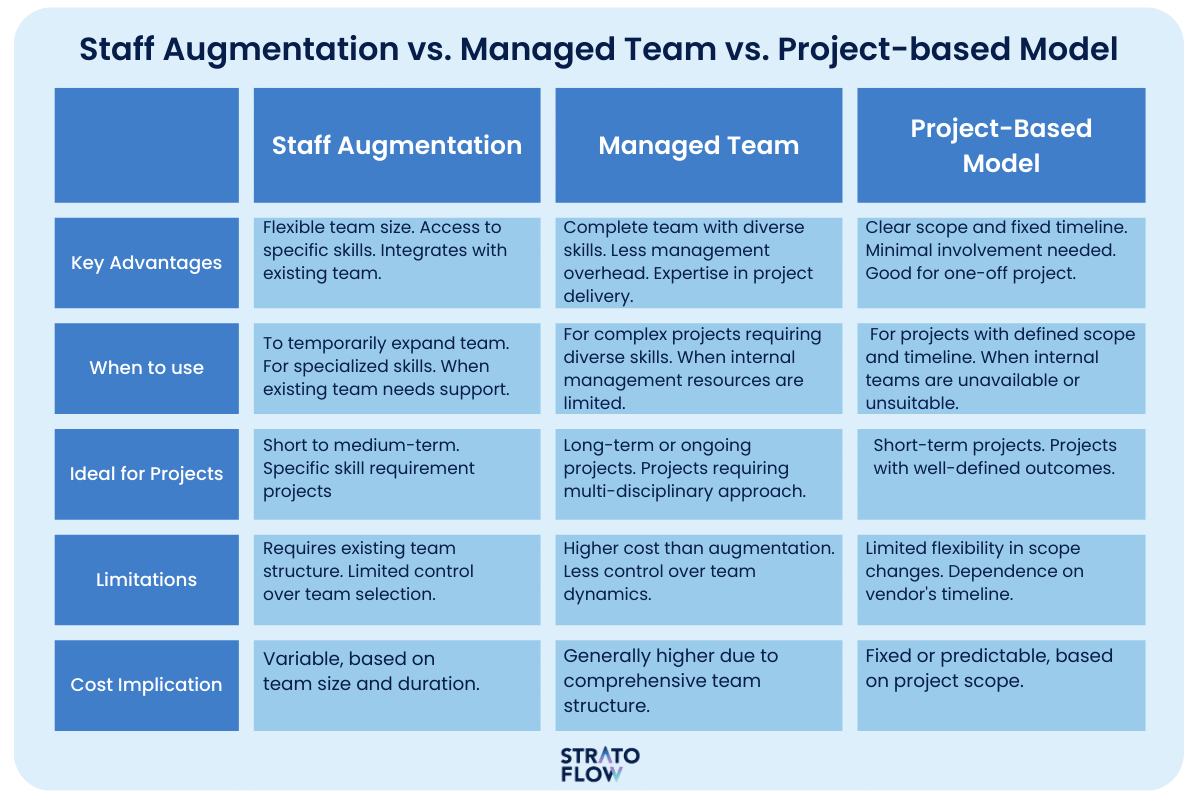
Staff Augmentation
Staff augmentation is a flexible hiring model where you can bring in external developers to work alongside your in-house team.
The augmented developers work under your direct supervision, following your processes, ensuring you retain control over the project. It’s a great option when you need extra hands for short-term projects or when specific expertise is required for a limited time, without the commitment of permanent hires.
Key advantages
- Flexibility: Easily adjust the size of your development team based on current project needs.
- Cost-Effective: Reduces the development and maintenance costs and commitments associated with permanent hires.
- Specialized Skills: Access to a wide pool of talent with specific skill sets that might not be available in-house.
When to choose?
- When there’s a need for specialized skills temporarily.
- To handle increased workload during peak periods without committing to long-term hires.
- For filling gaps in the current team’s expertise or capacity.
Managed Team
The managed team model provides you with a dedicated group of developers who take full responsibility for a specific part of your project or even the entire development process.
In this setup, the team works autonomously, but you stay connected to ensure alignment with your overall goals. This model is beneficial when you want to focus on core business activities while letting the managed team handle day-to-day development tasks. Often, the team is led by a project manager who takes care of everything from planning to delivery.
Key advantages
- Comprehensive Solution: The dedicated development team model provides a full-fledged team, reducing the need for extensive in-house management (insourcing).
- Expertise: Access to a team with a proven track record and expertise in specific areas.
- Efficiency: Often faster setup and commencement of work compared to building a team from scratch.
When to choose?
- For complex projects requiring a diverse range of skills and roles.
- When internal resources or expertise are insufficient for managing a development project.
- To ensure a more hands-off approach while maintaining quality and expertise.
Project-based Model
The project-based model is perfect when you have a clearly defined project with a fixed scope, timeline, and deliverables.
In this setup, you hire a dedicated team of developers to take care of the entire project from start to finish. After setting the initial requirements, you can step back, as the team works independently, delivering the completed project on time and within budget.
Key advantages
- Clear Scope and Timeline: Defined project scope and timeline, often with a fixed cost.
- Responsibility: The external team is fully responsible for delivering the project, reducing your management burden.
- Expert Execution: Often provided by teams with specific expertise in delivering similar projects.
When to choose?
- For projects with a well-defined scope and end goals.
- When internal teams lack the capacity or specific expertise to undertake the project.
- Ideal for one-off projects or when a company prefers not to be heavily involved in the day-to-day development process.
[Read also: Off the Shelf vs Custom Software: Pros & Cons + Examples]
Where can you find the best dedicated developers?
Finding the right dedicated developers for your project is a critical step in ensuring its success.
A valuable resource for this search is Clutch, a platform that specializes in gathering and presenting detailed information about custom software development companies that provide bespoke development services dedicated development teams.
It’s a platform where you can find a wide range of software development companies, each with a detailed profile. These profiles often include the size of the company, its location, and its specific areas of expertise.
A key feature of Clutch is its collection of verified customer reviews. Reading these reviews provides insight into how companies perform and the quality of work they deliver. Client testimonials on Clutch can also be incredibly insightful, providing a window into the experiences of past clients.
In addition, many companies on Clutch present case studies of their projects. These case studies are particularly useful for understanding how a company approaches challenges and problem solving. It’s also beneficial to look for companies that have worked on projects similar to yours, as this experience can be beneficial to the success of your project.
Other Considerations When Choosing a Partner
In addition to utilizing Clutch for research, there are other important factors to consider when selecting a dedicated development partner.
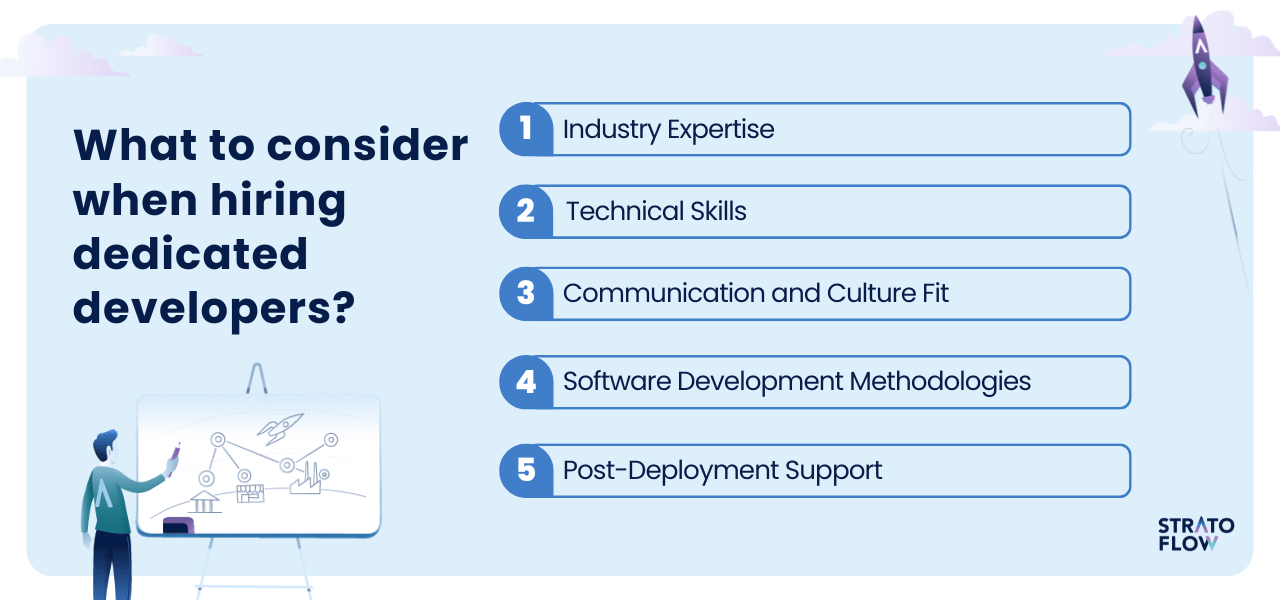
- Industry Expertise: Opt for companies with specific expertise in your industry. They are more likely to understand and meet your unique project needs.
- Technical Skills: It’s essential that the company possesses the technical skills necessary for your project, including familiarity with the required tech stack and technologies.
- Communication and Culture Fit: Effective communication is key to project success. Assess how the company communicates during initial discussions and consider if their culture aligns with yours. This alignment can greatly influence the smoothness of your collaboration.
- Software Development Methodologies: Evaluate the company’s project management methodologies. The team of dedicated developers must have a structured approach to managing projects, which should include clear timelines, milestone tracking, and regular updates.
- Post-Deployment Support: Consider the level of post-deployment support offered by the company. Reliable and ongoing support is crucial for addressing any issues that arise after the software goes live.
[Read also: Software Development in Poland: a Guide to IT Outsourcing]
How to hire dedicated programmers in eight steps
What does the process of working with a custom software development company look like? Let’s look at 8 key steps that you need to follow if you want to outsource your software development process to a team of dedicated remote developers.
Follow it closely to ensure that you pick the right software partner and that your cooperation will be fruitful and free of any issues.
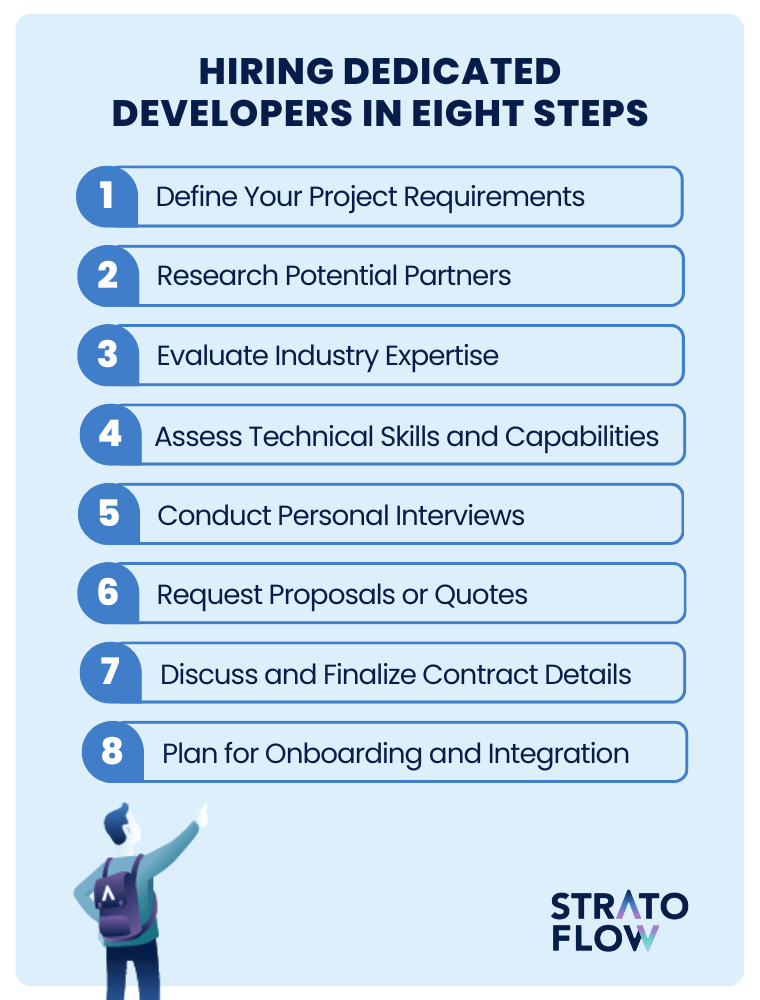
Step 1: Define Your Project Requirements

Before starting the search for dedicated developers, it’s critical to have a clear understanding of your project’s requirements.
This is the first phase of the software development lifecycle and should be performed when hiring a dedicated development team.
This step involves outlining the specific goals, scope, and functionality you expect from the software. It’s important to consider factors such as the target audience, key features, desired tech stack, and any special considerations such as scalability or security requirements. A well-defined project scope will help you identify the right dedicated development team with the necessary skills and experience, and will also help you communicate your vision and expectations to potential partners.
Step 2: Research Potential Partners

Once you have a clear picture of your project requirements, the next step is to research potential development partners.
This can include looking at online platforms such as Clutch, which provide detailed information about software development companies, including customer reviews and ratings.
Consider companies with a solid track record of delivering similar projects. It’s also beneficial to look at their portfolios and case studies to gauge their experience and success in delivering projects similar to yours.
Step 3: Evaluate Industry Expertise
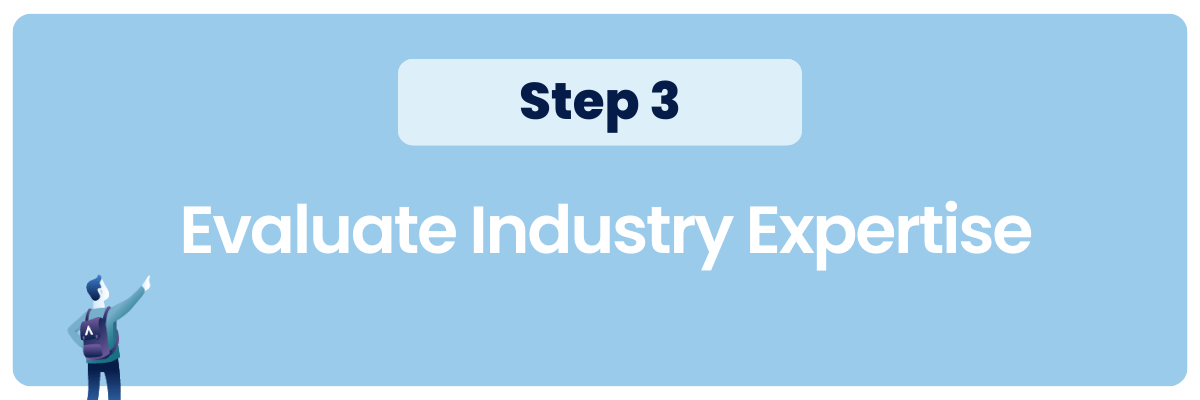
When considering potential partners, evaluate their industry-specific expertise.
A team with experience in your industry will have a better understanding of your unique challenges and requirements. They are likely to be more familiar with industry standards, compliance issues, and customer expectations. This step is especially important when outsourcing dedicated developers for projects in industries such as fintech, travel, ecommerce or healthcare.
All of these require industry-specific knowledge to properly understand business objectives.
If your dedicated development team already understands these nuances and business vocabulary, they will be able to hit the ground running, saving time on the lengthy onboarding process.
Step 4: Assess Technical Skills and Capabilities
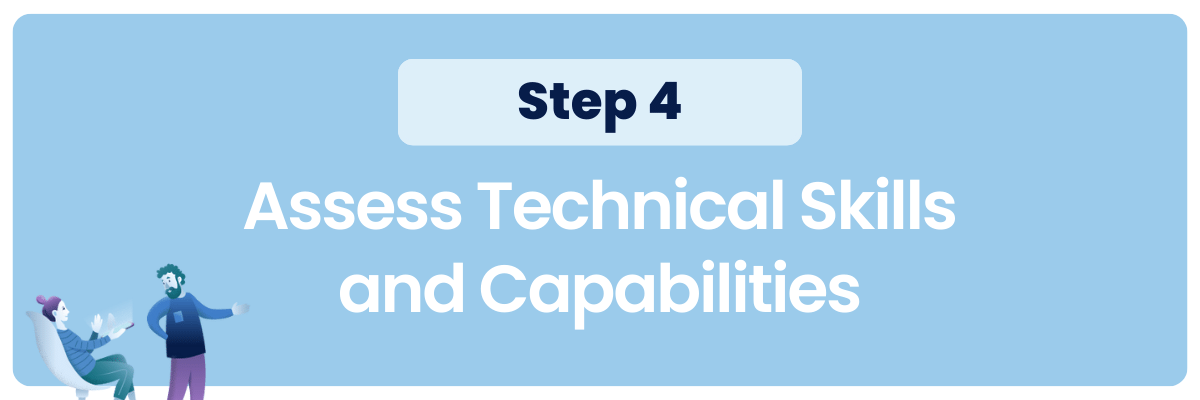
Evaluating the technical skills and capabilities of potential development partners is critical.
Make sure they have experience with the technologies and programming languages required for your project.
Check out the company case studies and testimonials posted on Clutch. Read their reviews.
These sources of information can shed light on the reputation of the development team you are considering working with.
It’s also important to understand their ability to handle the size and complexity of your project. Ask about their experience with the latest development methodologies and tools, and how they stay current with emerging technologies.
Step 5: Conduct Personal Interviews

Of course, no amount of online reviews can replace meeting the dedicated development team members in person.
That is why personal interviews with the potential custom software development partner are essential. This step allows you to assess their communication skills, understand their approach to problem solving, and gauge their enthusiasm for your project.
Interviews can provide insight into the team dynamics and compatibility with your own team culture. It also provides an opportunity to address any doubts or concerns you may have about their skills and experience.
Step 6: Request Proposals or Quotes

When you have narrowed down your options, request detailed proposals or quotes from the companies you have selected.
These should include comprehensive information about the project timeline, cost estimates, dedicated team composition, and specific services offered. You may want to sign a non-disclosure agreement during this step. The proposal should be closely aligned with your project requirements and provide a clear picture of how the company plans to execute your project.
Step 7: Discuss and Finalize Contractual Details
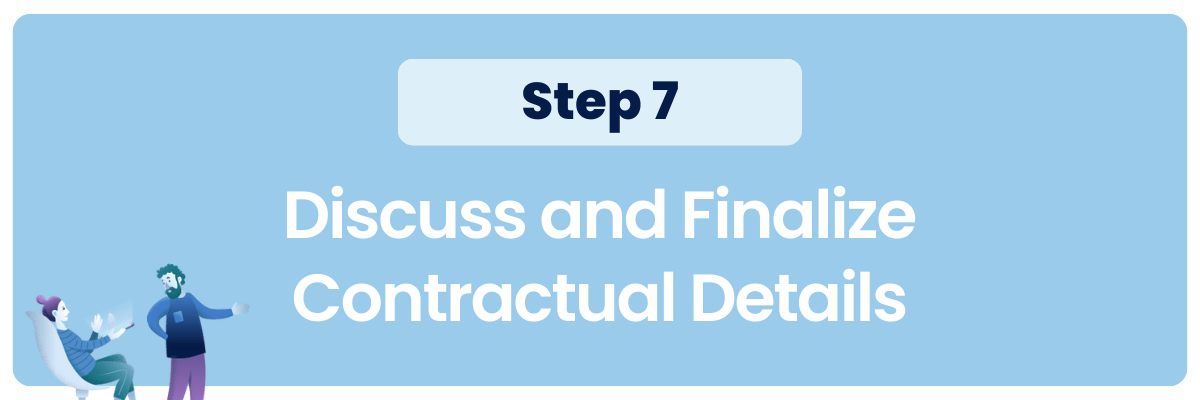
Once you have selected a development partner, the next step is to discuss and finalize the details of the contract.
This includes negotiating pricing and setting clear terms for deliverables, deadlines, and payment schedules. Make sure the contract addresses issues such as confidentiality, data security, intellectual property rights, and termination.
A well-drafted contract provides a legal framework for the project and protects the interests of both parties.
If you want to see what our software development agreement document looks like, we’ve described it in one of our post blogs. Be sure to check it out!
Step 8: Plan for Onboarding and Integration

The final step is to plan for onboarding and integrating the dedicated team into your project workflow.
This includes setting up communication channels, project management tools, and regular meeting schedules. It’s important to establish clear lines of communication and reporting structures. Onboarding also involves aligning the talented developers with your project goals and company culture to ensure smooth and effective collaboration.
[Read also: Application Development Guide: Types of Applications and Development Methodologies]
What to avoid when hiring dedicated developers – three common mistakes
Mistake 1: Prioritizing Costs Over Quality
When hiring dedicated developers and offshore dedicated developers, a common mistake is to focus more on cutting costs than ensuring quality.
While it is important to find a cost-effective solution, choosing the cheapest option can sometimes lead to subpar results. Lower rates don’t always translate into the best value, especially if the quality of work doesn’t meet the required standards. This can lead to additional costs down the line, such as fixing mistakes or redoing work.
Companies should strike a balance by seeking reasonable rates without compromising the expertise and experience required for their project. Remember, investing in quality now can save money and time in the long run.
Mistake 2: Conducting Inadequate Requirement Analysis
Skipping a thorough requirements analysis before hiring dedicated developers is a mistake that can derail a project from the start.
Without a clear, detailed understanding of what the project needs, you could end up with a team that is ill-equipped to meet your specific challenges. It’s critical to know exactly what skills and expertise your project requires, from the tech stack to the level of experience needed.
A well-defined project scope ensures that you hire the right developers, reducing the risk of project delays and mismatches. Accurate requirements analysis is the foundation of a successful development process.
Mistake 3: Assuming You Don’t Need a Project Manager
Some organizations assume that hiring dedicated developers means they can do without a project manager, but this assumption can lead to project inefficiencies.
A project manager plays a key role in keeping the project on track, managing schedules and budgets, and ensuring clear communication between all parties. Without this oversight, projects can easily get off track, miss deadlines, or go over budget.
A project manager acts as a bridge between the development team and the business, aligning the project with strategic goals and smoothing out any operational wrinkles. Their expertise in managing people and processes is invaluable to a successful project.
How much does a dedicated developers team cost?
So you want to hire dedicated developers, but you are not sure what budget you need to allocate for this project.
Not to worry!
Let’s shed some light on the cost of custom software development and see how much it costs to hire a dedicated team.
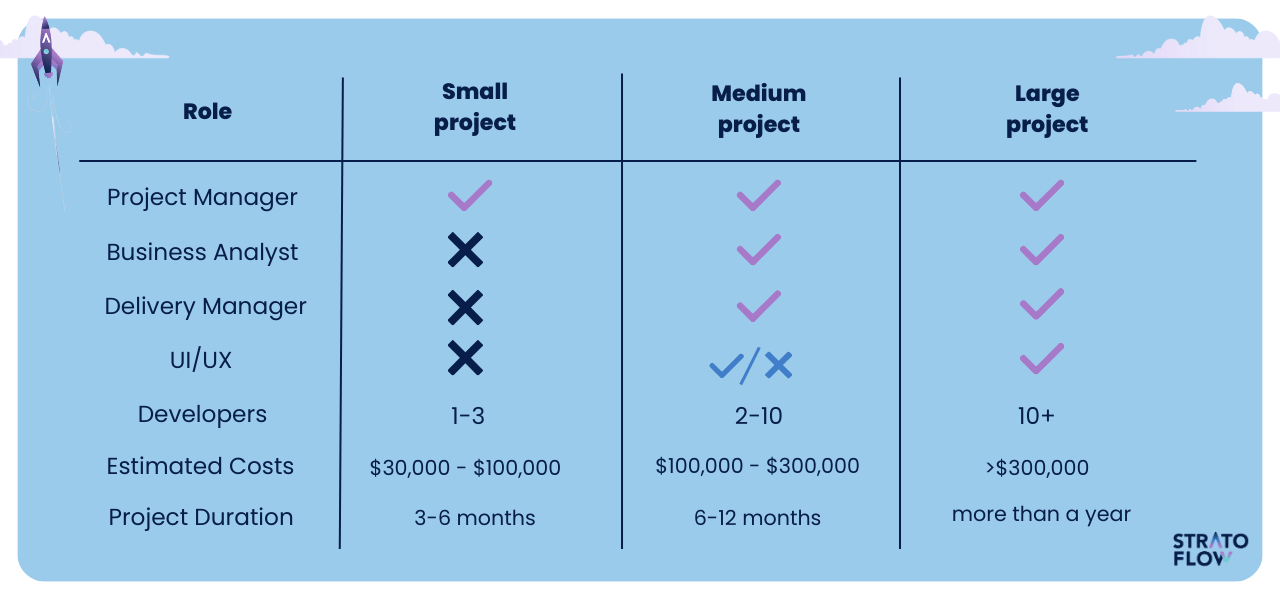
Small Application
- Team Composition: Typically requires 2-4 developers.
- Additional Roles: May include a part-time project manager or business analyst.
- Project Duration: Generally 3-6 months.
- Estimated Cost: $30,000 – $100,000. This cost can vary depending on the developers’ geographical location and level of expertise.
Medium Software Development Project
- Team Composition: Usually needs 5-8 highly skilled developers.
- Additional Roles: Likely requires a full-time project manager, a business analyst, and possibly a quality assurance (QA) specialist.
- Project Duration: Around 6-12 months.
- Estimated Cost: $100,000 – $300,000. The increased cost reflects the larger team and the additional roles needed for effective project management and quality control.
Large Enterprise Software Project
- Team Composition: Could require 10 or more developers.
- Additional Roles: Often includes a project manager, one or more business analysts, a QA team, and potentially a scrum master for Agile methodologies.
- Project Duration: Usually more than a year.
- Estimated Cost: $300,000 and above. Large projects with complex requirements and longer timelines demand a bigger budget due to the extensive team and the diverse range of expertise required.
It’s important to note that these are rough estimates.
Actual costs may vary based on the specific requirements of the project, developer hourly rates (which may vary based on location and experience), and any additional expenses such as software licenses or specialized tools.
In addition, factors such as the technological and business complexity of the project, the need for custom solutions, and any unforeseen challenges can also affect the total cost.
That’s why it’s a good idea to get detailed quotes from service providers for a more accurate budget.
If you would like a quote for your project, send us a message and we will be more than happy to see what it would take to make your vision a reality!
How should you manage a dedicated development team?
Managing a dedicated team of developers requires a strategic approach that balances effective communication, clear goals, and a supportive environment.
It’s about creating a collaborative workspace where the team feels motivated and aligned with the project’s goals.
This includes regular check-ins, providing clear and detailed feedback, and fostering a culture of open communication. It’s also important to respect their expertise and encourage innovation by allowing them to contribute ideas and solutions. Good leadership involves not only directing, but also listening, understanding, and responding to the team’s needs and challenges.
Establishing a relationship based on trust, coupled with a structured management approach, will ensure that the team remains focused, productive, and aligned with the project’s goals.
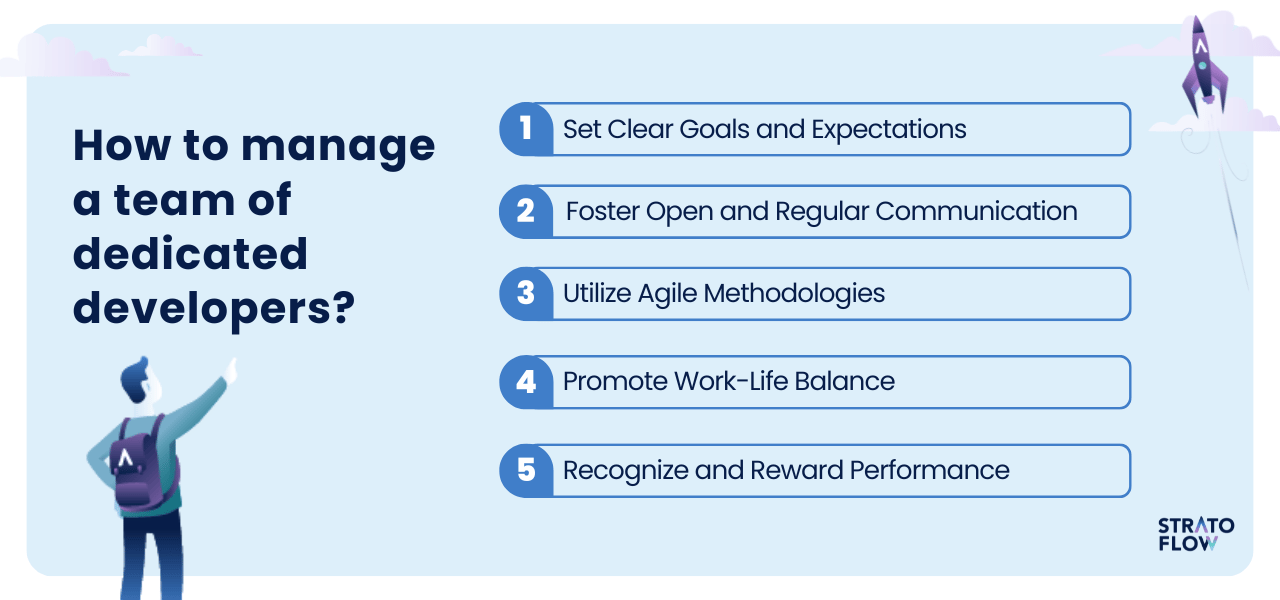
Best Practices for Managing a Team of Dedicated Developers
Set Clear Goals and Expectations
As we’ve already established it’s important to clearly define project objectives, timelines, and deliverables from the outset.
Ensure that every team member understands their role and what is expected of them. Regularly revisiting and updating these goals keeps the team focused and aligned with the project’s progress.
Foster Open and Regular Communication
Maintain open lines of communication. Schedule regular meetings for updates, feedback, and brainstorming sessions. Encourage team members to share their ideas and concerns, creating a collaborative and inclusive atmosphere.
Utilize Agile Methodologies
Implement agile methodologies like Scrum or Kanban, which emphasize flexibility, continuous improvement, and iterative development. This approach helps in managing tasks efficiently while adapting to changes swiftly.
Promote Work-Life Balance
Ensuring a healthy work-life balance for the team is crucial. Avoid overburdening developers with unrealistic deadlines and excessive workloads.
Encourage regular breaks and respect their time outside of work hours. A well-rested and balanced team is more productive and innovative. This approach not only reduces burnout but also fosters a more dedicated and loyal team environment.
Recognize and Reward Performance
Acknowledge and reward hard work and achievements. Recognizing individual and team successes fosters motivation and a sense of ownership over the project. Celebrating milestones and successes builds a positive team culture.
[Readl also: How to Choose a Software Development Company in 2023 [CHECKLIST]]
What are the benefits of hiring dedicated developers?
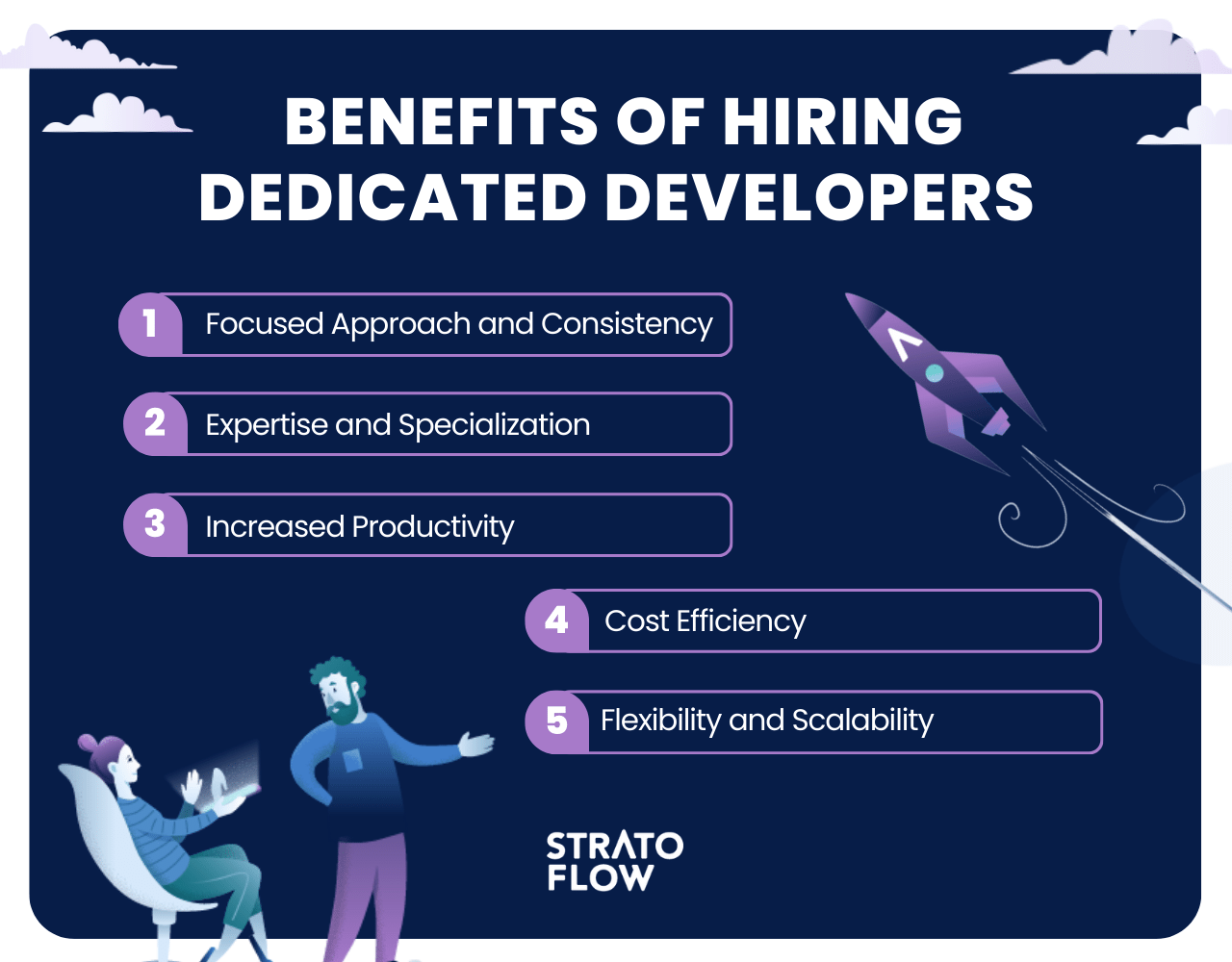
Cost Efficiency
In today’s economic climate, cost has become a top priority for many companies.
As global markets slow, organizations are seeking ways to optimize spending without affecting quality or timelines.
Hiring dedicated developers can be more cost-effective than building an in-house team, particularly for short-term or specialized projects. It reduces overhead costs like benefits, training, and office space, while offering the flexibility to scale teams based on project needs.
If you hire a development team from countries with lower labor costs, such as Poland, it can greatly reduce expenses without compromising software quality.
Expertise and Specialization
Dedicated developers bring specialized expertise, often with skills in specific programming languages or technologies that your in-house team may lack. Every software project requires a unique set of tools and technologies, known as a tech stack, and finding developers skilled in emerging technologies can be difficult, especially within a limited talent pool.
By outsourcing and hiring dedicated developers, you can access a broader range of talent, no longer restricted by geography. Whether through staff augmentation, managed teams, or project-based models, you gain access to developers with diverse skills and experience across multiple tech stacks.
Increased Productivity
Hiring dedicated developers focused solely on your projects can lead to a big boost in productivity. With their full attention on one project, they’re fully invested, resulting in faster progress and more efficient development than when juggling multiple clients or tasks.
Outsourcing dedicated developers also brings the advantage of different time zones.
Teams from around the world can work in shifts—when one finishes, another begins. This creates a near 24-hour development cycle, where work continues even when your local team is off the clock.
Focused Approach and Consistency
Since dedicated developers work exclusively on your project, they gain a deeper understanding of your company’s goals, culture, and needs.
This focused attention leads to higher-quality results, as they can better align their work with your business vision.
A major advantage is their integration of agile methodologies, which emphasize collaboration, adaptability, and continuous improvement. Using approaches like Scrum or Kanban, dedicated teams manage projects more efficiently and respond quickly to changes.
Flexibility and Scalability
Dedicated developers provide organizations with exceptional flexibility and scalability.
You can work with dedicated teams for the duration of a specific project without being tied to long-term employment commitments.
This project-based model is ideal for businesses with fluctuating workloads or one-off projects, allowing you to scale your development capacity up or down as needed, without the costs of maintaining a permanent team.
[Read also: How to Find Software Developers in 2023? 10 Experts Tips]
Software development outsourcing market statistics
The popularity of this model of custom software development is still immense.
In 2022, the global custom software development market focused on outsourcing dedicated software developers was valued at approximately USD 28.2 billion to 29.29 billion. It is projected to grow at a Compound Annual Growth Rate (CAGR) of around 21.5% to 22.4% from 2023 to 2030/2032. Large enterprises held a significant market share in 2022, as custom software often serves as a source of competitive advantage for these businesses.
By 2030, the market is forecasted to reach about USD 146.18 billion to 185.1 billion.
[Read also: How to Find and Hire Full Stack Developers in 2024: Guide + Best Practices]
Hire dedicated developers with Stratoflow
Our expertise in high-performance Java-based solutions has earned among reputable organizations such as the Financial Times and Deloitte.
We specialize in finance, travel, healthcare, and e-commerce, leveraging our deep domain expertise and technical capabilities.
Hire the Stratoflow development team in four simple steps
- Step 1: Describe your needs
- Step 2: Schedule a quick introductory meeting
- Step 3: Set out project milestones
- Step 4: Finalize Terms and Start the Project
Related Posts
Thank you for taking the time to read our blog post!
